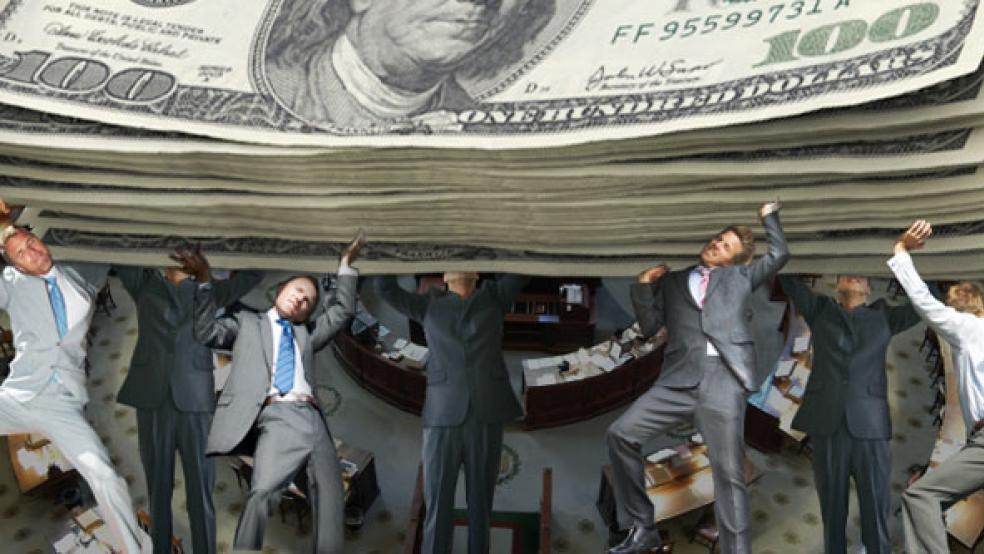Until Federal ReserveBoard Chairman Ben Bernanke raised concern about it in a speech last week to the Economic Club of New York, the fact that the Treasury will once again hit the debt ceiling in a few months has received scant attention from Congress, the White House and the financial markets.

A little more than a year ago, Washington was caught up in a suspenseful political drama as President Obama and House and Senate Republican leaders fought over the terms of raising the national debt limit to avoid the Treasury’s first default on borrowing in U.S. history. Republican House Speaker John Boehner insisted that any increase in borrowing authority be matched dollar for dollar with cuts in spending. But today, with all eyes on the looming fiscal cliff, the soon-to-be-expiring $16.4 trillion debt ceiling has become a relative after thought compared to the fears of the effects of year end spending cuts and tax increases.
A new study by the Bipartisan Policy Center released Tuesday warns there will be far less time than before to work out a new agreement before the Treasury hits the debt limit and begins defaulting on some of its borrowing and government obligations. The Treasury will reach its current statutory debt limit in the last week of December. By mid February 2013, it will have insufficient cash on hand to make all payments when owed.
The government last year used a series of financial maneuvers and tricks to forestall a default on the debt for nearly 11 weeks before a deal was finally struck in early August. This time, the Treasury will have no more than four to eight weeks before hitting a wall, according to the study. That’s because the government will be paying out far more – in federal tax returns and interest and principle on its debt -- than it will be taking in early next year.
Moreover, the government will be sure to waste an inordinate amount of taxpayers’ dollars if it has to play that game again. The Treasury was forced to squander an estimated $18.9 billion long term in excess interest costs and premiums to continue meeting federal financial obligations while the debt ceiling talks dragged on in 2011. Those wasted funds are the equivalent of what it will cost Congress to once again cancel scheduled cuts in Medicare payments to physicians for the coming year -- the so called “Doc Fix.”
Steve Bell, a former Republican Senate budget adviser and now senior director of the BPC’s Economic Policy Project, said he marvels that the expiring debt ceiling has been relegated to a secondary concern. That’s especially true after Standard & Poor’s downgraded the government’s AAA credit rating by one notch in August 2011 to express its dismay with the political turmoil and “brinksmanship” in Washington, even after the last- minute deal struck by Congress and Obama. A repeat of that protracted battle over raising the debt ceiling again could invite a much more severe response and downgrade from S & P, Moody’s and other major bond rating agencies . Such a development could force many institutional investors to move their money out of government bonds, Bell said.
Bernanke and other economists and experts have repeatedly warned that the government’s failure to avoid the year end fiscal cliff would be a disaster that would likely push the economy back into recession and lead to millions of job layoffs. But Bell warned that failure to raise the debt ceiling could have an even more damaging effect on the economy and the government’s ability to borrow.
“From a market point of view, going off the fiscal cliff would have some impact, I don’t know what it would be,” Bell told the Fiscal Times. “It certainly would not be bad for the bond market. But the debt ceiling is a different order of magnitude. And right now, nobody cares about that except Bernanke.”
Bernanke said in his speech last week that failure by Congress to raise the debt ceiling again would impose heavy costs on the economy. Senate Majority Whip Dick Durbin, D-Ill., said in a speech yesterday that the debt ceiling and fiscal cliff should be coupled together in negotiations, since no one wants to slog through tough talks on the budget and then repeat the exercise a few weeks later.
Robert D. Reischauer, a former director of the Congressional Budget Office , said “It’s likely Republicans will insist on sort of limited increases in the debt ceiling” that would give them some leverage in their negotiations with Obama and the Democrats during the lame duck session and early next year.
Indeed, after President Obama urged Boehner at a recent White House meeting to raise the debt limit before the end of the year, Boehner responded, “There is a price for everything,” according to Politico.
A hard and fast deadline for the Treasury running out of cash will depend on a number of “wildcards,” according to the Bipartisan Policy Center report. Those include whether the tax filing season is delayed because Congress fails to take action to prevent an expansion of the Alternative Minimum Tax by the end of the year; possible emergency spending legislation to assist New York, New Jersey and other states that were clobbered by Hurricane Sandy, and monthly fluctuations in government spending and revenues.
“If the debt limit is not increased as part of the lame duck negotiations, policymakers will be left with only a matter of weeks to ensure that all federal financial obligations continue to be met in full and on time,” the center’s report concluded.





